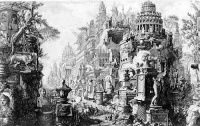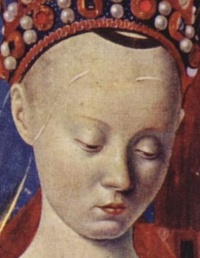Art
From The Art and Popular Culture Encyclopedia

_by_Édouard_Manet.jpg)
|
Related e |
|
Featured: |
- «La culture, c’est la règle, et l’art, c’est l’exception» --Jean-Luc Godard
Art is the process or product of deliberately arranging elements in a way to affect the senses or emotions. It encompasses a diverse range of human activities, creations, and modes of expression, including music, literature, film, photography, sculpture, and paintings. The meaning of art is explored in a branch of philosophy known as aesthetics.
Traditionally, the term art was used to refer to any skill or mastery. This conception changed during the Romantic period, when art came to be seen as "a special faculty of the human mind to be classified with religion and science". (Gombrich) Generally, art is made with the intention of stimulating thoughts and emotions.
Contents |
Synonyms
Antonyms
- (Human effort): mundacity, nature, subsistence
Definition
The term art is used to describe a particular type of creative production generated by human beings, and the term usually implies some degree of aesthetic value. An artist makes a work of art for various purposes, such as creating an experience for others or as part of a ritual. There is no general agreed-upon definition of art, since defining the boundaries of "art" is subjective, but the impetus for art is often called human creativity.
Art, in its broadest meaning, is the expression of creativity or imagination, or both.
Throughout the written history of humankind, various constrictions have been applied to the broad concept. Most individuals know what they consider to be art, and what they believe is not art. Additionally, groups, such as academia, have a vaguely shared notions of what is, or is not, art.
The word art is often used to refer to the visual arts, and arts is used to refer to visual art, literature, music, dance — the fine arts. However, such distinctions are the subject of many discussions and debates.
Art seems to be almost universal throughout the human race — integral to the human condition. There are no cultures that do not participate in it to some extent, and child art is created by all from about the first birthday.
Etymology
The word art derives from the Latin ars, which, loosely translated, means "arrangement" or "to arrange", though in many dictionaries the word's listing is tautologically translated as "art". This is the only universal definition of art, that whatever it is was at some point arranged in some way. A few examples where this meaning proves very broad include artifact, artificial, artifice, artillery, medical arts, and military arts. However, there are many other colloquial uses of the word, all with some relation to its etymological roots.
Research interests
- Art and politics
- Art as an excuse for depicting prurient interests
- Artworld economics
- Patronage
- Starving artist
- Tortured artist
- Byronic hero
Related topics
- Defining art
- Controversial art
- Abstract art
- Aesthetics, a philosophical field related to art
- Anthropology of art
- Applied art
- Art criticism
- Art gallery
- Art groups
- Art history
- Art styles, periods and movements
- Art techniques and materials
- Art therapy
- Artist
- Arts
- Beauty
- Figurative art
- Fine art
- Landscape art
- Modern art
- Design
See also









